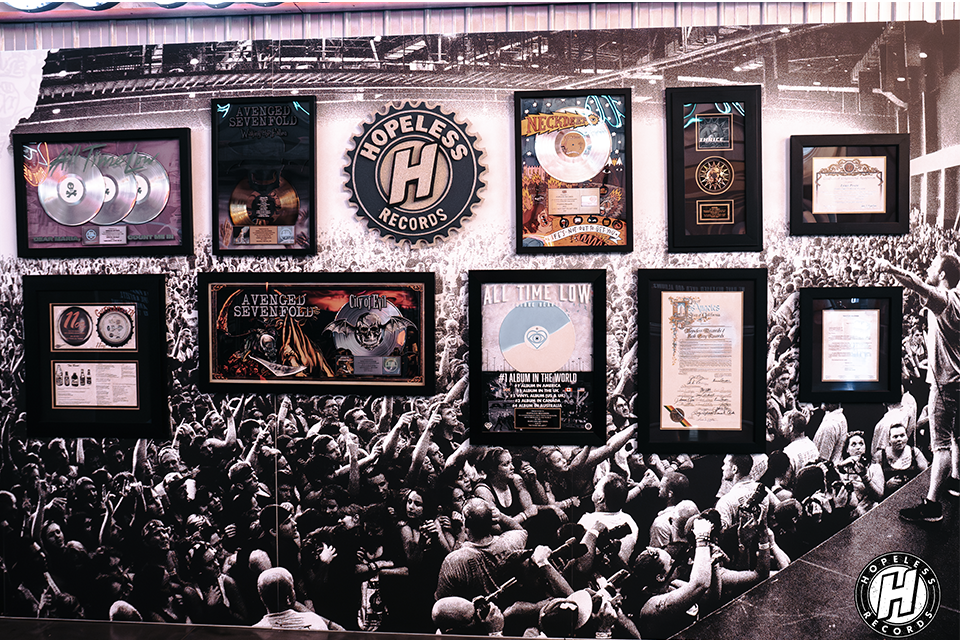The independent punk rock music label Hopeless Records has unexpected roots, not unlike punk itself. Three of its leaders (including its founder), all Matadors, started far, far from the recording studio: Founder and President Louis Posen ’02 studied film, CFO Al Person ’99 began working in banking but majored in music industry studies, and Vice President of Streaming and Promotion Josh Epple ’13 studied sociology after failing to get into CSUN’s music industry program.
Thirty years later, still based in the Valley, they’ve paved the way for punk artists such as The Wonder Years, label alumni All Time Low and Avenged Sevenfold. But how did three CSUN alumni and their record label get here?
Creativity and Resilience
Posen’s path began in the film industry, and he was drawn to CSUN’s hands-on, top-ranked film program.
“There was a lot of room [at CSUN] to figure things out and create on your own, which is something I took with me to start this label,” he said.
One of Posen’s earliest shots to create on his own was filming a music video for the punk rock band NOFX. Encouraged by his work with the band, in 1993, while still an undergraduate, he created a record label as a hobby. Unaware that it could be a business, he studied the book “How to Run an Independent Record Label.” This led to an introduction to SoCal punk rock band Guttermouth, for whom he’d directed and produced a music video prior to launching his label.
“The band asked me — dared me — to put out a record for them,” he said.
Challenge accepted. Posen worked with Guttermouth to release their 1993 album, “11oz.,” with the track “Hopeless,” which inspired the idea and name of Posen’s new label after its release.
While studying and running an upstart, independent label, Posen ran into some serious health concerns. At 19, he was diagnosed with retinitis pigmentosa, a rare eye disease that affects the retina, which caused him to slowly lose his eyesight. In 1994, the Northridge earthquake halted his film studies and in 1995, Posen lost eyesight in his right eye — he was declared legally blind. After taking a break from school, Posen realized he only had three credits left to complete his bachelor’s degree. In 2002, he finished his B.A. in Radio-Television-Film.
CSUN Roots Run Deep
On a journey of his own, Person grew up playing the drums and listening to progressive rock, which evolved into an interest in the music industry’s business side. He met Posen in 1996, when they became roommates, and Person joined Hopeless Records in 1998 as an office manager.
“He needed me to be his eyes,” Person said. He was the one Posen trusted to help guide projects and manage the finances of the company, eventually leading to his role as CFO.
Epple joined the Hopeless team years later, as part of a new generation. He grew up in Lancaster as a drummer and fan of punk music. He applied to CSUN’s music program, but after a “flubbed” audition and unable to read sheet music, Epple said, he had a decision to make: choose a different major or pick a different school. He enrolled at CSUN anyway, studying sociology and focusing on his new goal of working on the business side of the music industry.
He found the community at CSUN extremely inspiring, even from outside the music program itself.
“Being around so many people that had higher aspirations and wanted to be in the music industry was the most helpful part,” Epple said.
He was a fan of Hopeless Records for years before joining the staff. So much so that Epple applied for a job with the label during his final year at CSUN, in 2013. He was rejected the first time, but that didn’t stop his drive and passion for the company. He tried again in 2015, and this time, it was a perfect fit: Epple joined the label to spearhead Hopeless’ efforts in streaming and promotions, which led to his current position as vice president of streaming and promotions.
Philanthropy and Punk Rock Spirit
The label increasingly has embraced philanthropy since Posen created the nonprofit and imprint label Sub City Records in 1999. He and his team formed the nonprofit to raise funds and awareness for other nonprofit organizations important to their artists.
Person and Posen described the philanthropy as one of their most gratifying experiences since the birth of Hopeless Records.
“It is rewarding knowing that we are doing something that is connecting to make a positive impact, literally and emotionally,” Person said.
Sub City gives artists and their fans a chance to align musicians’ talent and dedication with causes for which they care deeply.
“It’s not about me, Hopeless isn’t about me. Anything I could do to make people’s lives better is rewarding,” Posen said.
Twenty-five years later, Sub City has raised more than $3 million for causes such as gun violence prevention, suicide prevention, mental health and blindness.
In December, Hopeless Records celebrated 30 years, with an exhibit featuring artifacts from past and present Hopeless artists, at the Valley Relics Museum. The exhibit will travel to multiple museums around the country this year, such as the Rock and Roll Hall of Fame in Cleveland, Ohio, this summer and The Punk Rock Museum in Las Vegas in October.
“While we started as a ‘punk’ label and still carry the original punk philosophy and ethos, Hopeless is now one of the largest independent record labels in the world with over 15 million albums sold,” Posen said.
Three decades down the line, the CSUN alumni look back at the label’s journey — and the individual parts they’ve played — and look forward to punk’s future.
“Keep evolving … I hope artists never feel like they have to conform to what was ‘punk’ 10 or 20 years ago,” Epple said.
Unconventional journeys and unexpected choices laid the foundation of Hopeless Records. The independent label was heavily influenced, the trio said, by lessons learned at CSUN.
“The most important thing you’re going to learn about in college is who you are,” Person said.
Embodying the relentless spirit of punk rock, the label and these three Matadors exemplify the power of perseverance and passion in the face of adversity — of never giving up on a dream.
“Don’t let failure stop you,” Epple advised today’s students. “Keep showing up and keep trying. You will find your place.”






